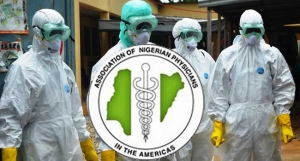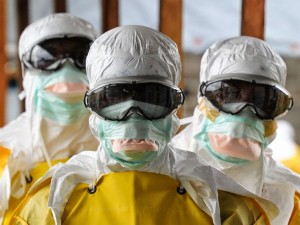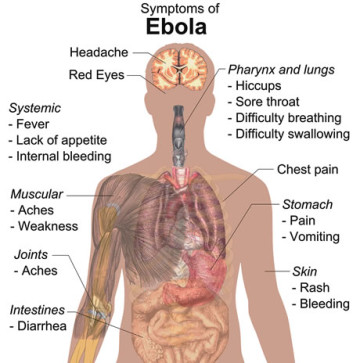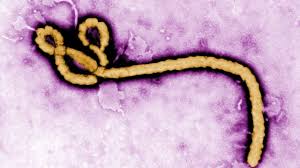Just in case you do not know, three fresh cases of the Ebola Virus Disease have been confirmed in Liberia and Sierra Leone in the last two weeks.
It is obviously not good news to citizens who lost their loved ones on the one hand, and health officials who lost colleagues to the virus while the infections lasted in West Africa.
These new cases popped up when both countries were thought to have been rid of the infectious disease that killed over 10,000 persons globally.
Nigeria lost some of her brilliant professionals to EVD in 2014. Worthy of note is the late senior physician, Dr. Stella Adadevoh, who handled the treatment of the index case.
Some may wonder why there were so many causalities. The reason is simple: Ebola is a highly infectious disease, such that one can contact it just by touching the surface that an infected person had touched previously.
Ebola is regarded in the medical world as the deadliest virus on earth, not only because it has no known cure yet, but also because it is one of the world’s lethal infections: it could kill within hours or few days of symptom onset, whether an infected person gets treatment or not.
The initial symptoms of the viral disease can include sudden fever, intense weakness, muscle pain and sore throat; and it can later progress to vomiting, diarrhoea and, in some cases, internal and external bleeding.
Scientists note that the fearful aspect of the disease is that it is highly infectious. It has killed both doctors and patients alike. It does not respond to any vaccine. It can live in the body system of an infected person for two days to three weeks without any symptoms.
Worse still, Ebola is difficult to diagnose. Doctors note that by the time the symptoms start to manifest in an infected person, it is often too late to stop the spread of the virus to vital organs of the body. The best treatment affected persons get is therapy.
Experts say we must not forget the very important lessons and habits we learnt from the last Ebola outbreak.
Preventing infection
Reiterating the need for residents to adopt urgent precautionary measures against the disease, the Permanent Secretary in the State Ministry of Health, Dr. Modele Osunkiyesi, urges members of the public to observe and maintain high standards of personal and environmental hygiene to prevent another outbreak of the highly infectious disease.
Osunkiyesi notes that the main host of the virus is relatively unknown; however, she says, there is enough scientific evidence to show that Ebola virus can be contracted by persons handling sick or dead infected wild animals, including chimpanzees, gorillas, monkeys, forest antelope, and fruit bats.
She says, “Ebola virus can be spread through close contact with the blood, body fluids, organs and tissues of infected animals; direct contact with blood, organ or body secretions of an infected person. The transmission of the virus by other animals like monkey and chimpanzee cannot be ruled out.”
Osunkiyesi states that those at the highest risk of contracting the disease include health care workers who treat patients without taking necessary precautions against infection; and families or friends of an infected person who could be infected in the course of feeding, holding and caring for the sick.
She notes that one could contract the virus from an infected person as long as their blood and secretions contain the virus – in some cases, up to seven weeks after they have recovered. Even those who come in contact with body fluids of a person killed by this virus are not exempted!
Recognise the risk
She adds that though there is no specific treatment for the disease, persons with symptoms – including bleeding from the eyes, mouth, nose, rectum and ear; or those suffering from fever, malaria and cholera – should report to the health centres closest to them, where they would be admitted for special care and treated in isolation.
Hunters and those who eat or handle game meat of monkeys and chimpanzees are also at risk, experts say; that is why the World Health Organisation warns against consuming raw bush meat and forbids any contact with infected bats, monkeys and apes, saying that these game meats were considered delicacies in the areas where the outbreak started.
Wash your hands
Public health physician, Dr. Segun Adeboye, notes that the importance of washing one’s hands with soap and water to get rid of germs, bacteria and other viruses cannot be overemphasised.
According to him, this age-long habit has been proved to reduce the risk of getting infections by more than 60 per cent.
Adeboye says, “Many people are aware of washing of hands, but what we are saying is that you should use soap or disinfectant when you wash hands. That is what will kill the bacteria or virus.
“Also, the hand is the means by which most infections are contracted. And the average person touches his/her mouth at least 10 times a day. Imagine if you had touched an infected person with your hand unknowingly, and you don’t wash your hand before eating.
“You have introduced a virus into your body just by being negligent. Science has proved that 70 per cent of infections are contracted via the mouth through the hands.”
If you can’t access potable water, you can always improvise with hand sanitisers. They are portable, which means you can carry one in your bag, car and in your office locker.
PUNCH.





